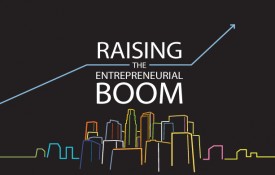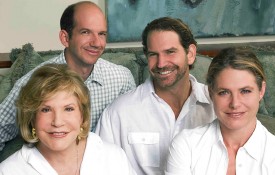As a recent report from the Journal of Higher Education shows, children reap a greater professional advantage from their parents’ social status than from educational achievement alone. What’s more, studies reveal that up to 85% of jobs are filled through networking. While this is great news for socially connected job aspirants, it unfortunately creates an accessibility gap that leaves behind potential hires who don’t have the same advantageous connections.
My own 30-year career in finance began when I got a job at The Chicago Board of Trade through a family connection. Once I got my foot in the door of finance, I was able to climb the “greasy pole” to become CEO of MF Global, which then grew into the world’s leading broker of exchange-listed futures and options. Having managed to grow the company’s profits from $27M per year to $275M, I led the company to a $4B IPO in 2007.
Who knows where I would have ended up without that initial connection, but there is no doubt that it was my social network that set me on my way.
Over multiple years in leadership positions, certainly when I was CEO, I saw many applications for internships cross my desk, almost all of which came from the teenage kids of customers, colleagues, and even business rivals. Because most starting positions in finance stem from these summer internships, this necessarily meant that our new recruits represented a pretty narrow section of society. Very few applications—if any—came from students from underserved and underrepresented communities. This gap formed not because we did not want to hire people who would clearly have the most to benefit from such opportunities, but because we did not know how to find them, nor they us.
When companies continue to operate and hire within closed networking circuits, business leaders overlook a deep and diverse talent pool that has potential to bring fresh perspectives to business strategies and culture. With such a narrowly focused pipeline of talent, it is hardly surprising that 90% of Fortune 500 CEOs are white.
Once I retired, I reflected on the crucial role that social capital had played in setting me on my career path. I realized that, at that point in my life, I had accumulated quite a lot of social capital myself, certainly enough to help those with little or none. Additionally, I quickly came to understand that access to connections was not the single barrier; unpaid internships were a luxury that only well-heeled teenagers could afford to take.
This was the genesis of First Workings, a nonprofit I founded that arranges paid internships and mentorships for very bright public and charter school students from underrepresented communities in NYC, at major companies like Lazard, Morgan Stanley, NASDAQ, and Mount Sinai Hospital.
We decided to work with students in the summer between their junior and senior years when the experience has the potential to influence their college choices and course paths. And because most of our students will get a letter of recommendation from the company we introduce them to, we discovered that the experience we arranged often had an impact on the level of the college they were accepted to.
The success our program has enjoyed has been astonishing, and well beyond my greatest expectations. All of our students are accepted into college, 70% as first-generation college students, with about 15% making it into an Ivy League school. Virtually every one of our partner companies tells us that they have not only enjoyed working with the students we send them, but that it has woken them up to a potential pool of talent they’d had little or no contact with. Indeed, 80% of our partner companies say they would likely recommend our interns for future openings at their companies.
Finally, it is important to note that efforts to diversify need not be driven for purely altruistic reasons, or just to “tick a box.” Research has shown that companies with very diverse workforces experience up to 43% higher profitability than those without. With demographic trends suggesting a significant increase in the non-white workforce in the years to come, expanding recruitment efforts into the broader community makes both social and economic sense.
Kevin Davis is founder and chairman of First Workings, a nonprofit helping underrepresented NYC high schoolers acquire social capital through paid internships and one-on-one mentorships.
Want more from our C-Suite Thought Leaders? Read all of their articles here.
Photo courtesy of First Workings













































